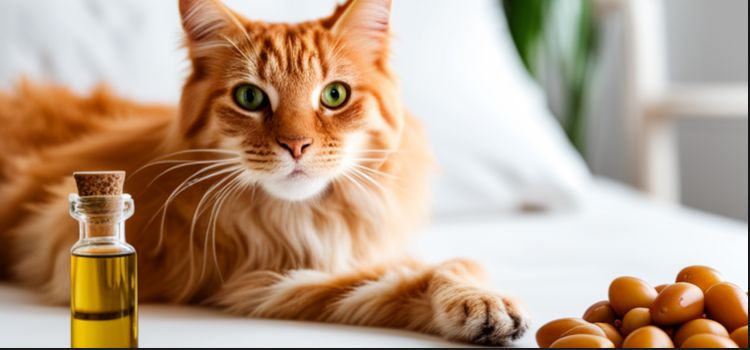As an Amazon Associate committed to the mission of improving the lives of our readers, Live-Clear.com receives a small commission from eligible purchases made through our affiliate links. This revenue enables us to keep producing insightful articles and other material.
Jojoba oil is not safe for cats. It can cause gastrointestinal upset and skin irritation.
Jojoba oil, though beneficial for humans, poses risks to cats. Cats have sensitive digestive and skin systems that can react negatively to substances safe for humans. Ingesting jojoba oil may lead to vomiting or diarrhea in cats. Topical application might cause skin irritation or allergic reactions.
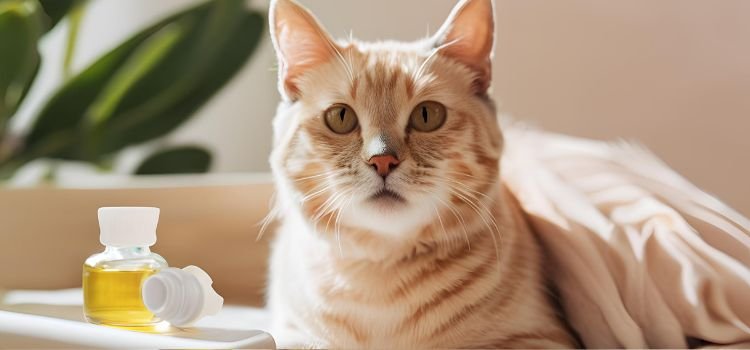
Pet owners should always consult a veterinarian before introducing any new product to their cat’s care routine. Safe alternatives specifically formulated for cats are available. Prioritizing your pet’s health ensures their well-being and prevents unnecessary complications. Always keep potentially harmful substances out of reach from your furry friends.
What Is Jojoba Oil?
Jojoba oil is a popular natural remedy. But is it safe for cats? Before answering that, let’s understand what jojoba oil is. This section will explain its origin, composition, and common uses.
Origin And Composition
Jojoba oil comes from the seeds of the jojoba plant. This plant grows in desert regions of North America. The plant’s scientific name is Simmondsia chinensis. Native Americans have used jojoba oil for centuries.
Jojoba oil is unique because it is not an oil but a wax ester. This makes it different from other plant oils. It closely resembles the natural oils in our skin.
Here are some key components of jojoba oil:
- Vitamin E: An antioxidant that helps protect cells.
- Vitamin B Complex: Promotes skin health.
- Fatty Acids: Essential for maintaining moisture.
- Minerals: Such as zinc and copper.
The table below summarizes these components:
| Component | Benefit |
|---|---|
| Vitamin E | Protects cells |
| Vitamin B Complex | Promotes skin health |
| Fatty Acids | Maintains moisture |
| Minerals | Supports overall health |
Common Uses
Jojoba oil has many uses in beauty and health products. People use it for skin care, hair care, and more.
Some common uses of jojoba oil include:
- Moisturizer: Hydrates and softens the skin.
- Hair Conditioner: Adds shine and reduces frizz.
- Makeup Remover: Gently removes makeup without harsh chemicals.
- Massage Oil: Provides a smooth glide and hydrates the skin.
- Lip Balm: Soothes and protects dry, cracked lips.
Here’s a brief overview of these uses:
| Use | Benefit |
|---|---|
| Moisturizer | Hydrates skin |
| Hair Conditioner | Adds shine |
| Makeup Remover | Removes makeup |
| Massage Oil | Hydrates skin |
| Lip Balm | Protects lips |
People love jojoba oil for its versatility and natural benefits.
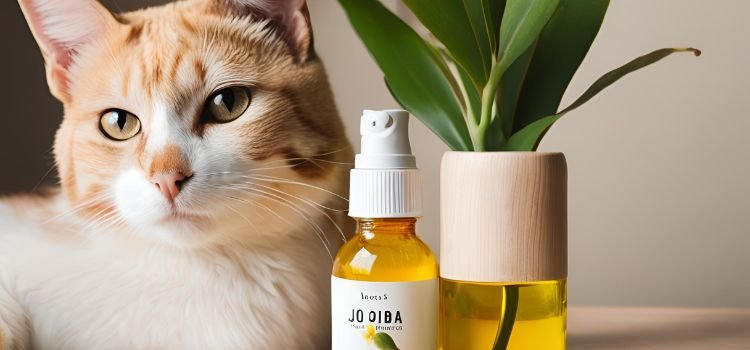
Jojoba Oil And Cats
Jojoba oil has become popular for its many benefits in human skincare. But pet owners wonder, is jojoba oil safe for cats? Cats have different sensitivities, and what works for humans might not be ideal for our feline friends. Jojoba Oil and Cats is a topic worth exploring to ensure your kitty stays healthy and happy.
Potential Risks
While jojoba oil is non-toxic to humans, it can pose potential risks to cats. Cats have unique metabolisms, and their liver processes substances differently. Jojoba oil contains erucic acid, which is not suitable for cats in large quantities.
Here are some potential risks:
- Digestive Issues: Ingesting jojoba oil can cause stomach upset, leading to vomiting or diarrhea.
- Skin Irritation: Some cats may develop allergic reactions or skin irritations when jojoba oil is applied topically.
- Respiratory Problems: If a cat inhales jojoba oil, it could lead to respiratory distress.
To ensure your cat’s safety, always consult your veterinarian before using jojoba oil on or around your pet. Consider using cat-safe alternatives for grooming or skincare needs.
Symptoms Of Toxicity
Recognizing the symptoms of jojoba oil toxicity in cats is crucial. If your cat shows any unusual behavior or signs, immediate action is necessary. Here are common symptoms to look out for:
- Vomiting: Frequent or severe vomiting can indicate that your cat has ingested something harmful.
- Diarrhea: Loose stools or diarrhea can be a sign of digestive upset due to jojoba oil.
- Excessive Drooling: Drooling excessively can be a sign of nausea or a reaction to an ingested substance.
- Labored Breathing: Difficulty breathing can indicate respiratory issues from inhaling the oil.
- Lethargy: Unusual tiredness or lack of energy can be a sign of toxicity.
- Skin Redness: Red, inflamed, or itchy skin can indicate a topical reaction.
If your cat exhibits any of these symptoms, contact your veterinarian immediately. Quick intervention can prevent serious health issues and ensure your cat’s well-being.
Safety Measures
Jojoba oil is often used by pet owners for various benefits, but is it safe for cats? Understanding the safety measures is crucial to ensure the health and well-being of your feline friend. Let’s explore the essential precautions when using jojoba oil for cats.
Alternative Products
While jojoba oil has many benefits, you might want to consider other safe options for your cat. Here are some alternatives:
- Coconut Oil: Known for its anti-inflammatory properties.
- Olive Oil: Helps with dry skin and adds shine to the coat.
- Fish Oil: Rich in Omega-3 fatty acids, great for overall health.
These oils can offer similar benefits without the potential risks associated with jojoba oil. Always ensure to use them in moderation and monitor your cat’s reaction.
Here’s a quick comparison table:
| Oil Type | Benefits | Potential Risks |
|---|---|---|
| Coconut Oil | Anti-inflammatory, Moisturizing | High-fat content |
| Olive Oil | Dry skin relief, Shiny coat | Possible diarrhea |
| Fish Oil | Omega-3, Improved health | Fishy odor |
Consulting A Veterinarian
Before applying any oil, including jojoba oil, always consult your veterinarian. Vets can provide personalized advice based on your cat’s health.
Here are some questions to ask your vet:
- Is jojoba oil safe for my cat?
- What dosage should I use?
- Are there any side effects to watch for?
Consulting a vet ensures that you are using the right product and dosage. This step is crucial for preventing any adverse reactions. Veterinarians can also recommend alternative products that are specifically formulated for cats, ensuring maximum safety and effectiveness. Remember, safety first. Always seek professional guidance before making changes to your cat’s care routine.
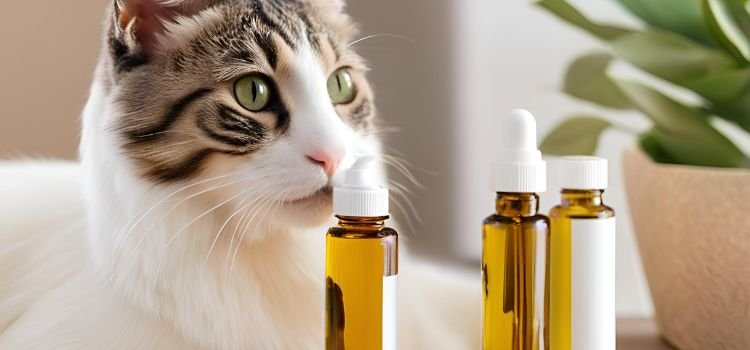
Jojoba Oil Exposure In Cats
Is jojoba oil safe for cats? This question concerns many pet owners. Jojoba oil, derived from the seeds of the jojoba plant, is commonly used in skincare products. But, is it safe for cats? Let’s explore jojoba oil exposure in cats.
Ingestion
Ingesting jojoba oil can be risky for cats. Although jojoba oil is non-toxic to humans, cats have different sensitivities. Small amounts might not cause harm, but larger quantities could lead to problems.
When a cat ingests jojoba oil, it might experience:
- Vomiting: Cats often vomit after ingesting foreign substances.
- Diarrhea: Gastrointestinal upset is common.
- Lethargy: The cat may become unusually tired.
These symptoms indicate that the cat’s digestive system is reacting poorly. If your cat ingests jojoba oil, monitor it closely. If symptoms persist, contact your veterinarian immediately.
Here’s a table summarizing the potential effects of jojoba oil ingestion in cats:
| Symptom | Description |
|---|---|
| Vomiting | Frequent expulsion of stomach contents |
| Diarrhea | Loose or watery stools |
| Lethargy | Unusual tiredness or weakness |
Preventing ingestion is crucial. Store jojoba oil out of reach and avoid using it on items your cat might lick.
Skin Contact
Skin contact with jojoba oil can have different effects. Many pet owners use jojoba oil to moisturize their cat’s skin. It is generally safe when applied topically, but there are some precautions to consider.
Possible reactions include:
- Allergic reactions: Some cats may have skin allergies.
- Irritation: Redness or itching might occur.
- Excessive grooming: Cats might lick the oil, leading to ingestion.
Before applying jojoba oil, perform a patch test. Apply a small amount to a small area of your cat’s skin. Wait 24 hours to check for any adverse reactions.
Benefits of jojoba oil for cats include:
- Moisturizing dry skin: Helps keep your cat’s skin hydrated.
- Soothing minor irritations: Can calm redness and minor skin issues.
- Promoting a healthy coat: Leaves fur shiny and soft.
Use jojoba oil sparingly. Too much oil can lead to greasy fur and potential grooming issues. Always consult your veterinarian before introducing new products to your cat’s care routine.
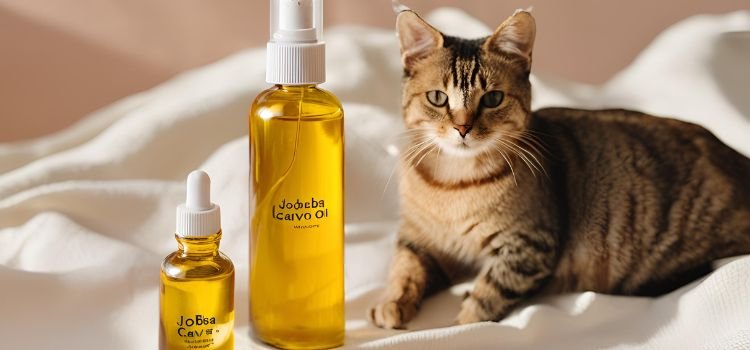
Treatment For Jojoba Oil Toxicity
Jojoba oil is a popular natural remedy for various skin issues in humans. But, is jojoba oil safe for cats? Cats are sensitive to many substances, and jojoba oil is no exception. This section discusses the treatment for jojoba oil toxicity in cats.
Immediate Actions
If your cat ingests jojoba oil, take immediate action. Cats can show signs of toxicity quickly. Look for symptoms like vomiting, diarrhea, or lethargy. Act fast to prevent serious complications.
Here are some immediate steps you can take:
- Remove Access: Move the bottle of jojoba oil away from your cat.
- Check Symptoms: Observe your cat for any unusual behavior or signs of distress.
- Don’t Induce Vomiting: Never induce vomiting without consulting a veterinarian. It can cause more harm than good.
- Call the Vet: Contact your veterinarian for advice. They can guide you on the next steps.
It’s vital to act quickly. Keeping a close eye on your pet can make a big difference.
Veterinary Care
Veterinary care is crucial for treating jojoba oil toxicity in cats. Your vet will perform a thorough examination. They may run tests to check the severity of the toxicity.
Common treatments include:
- Activated Charcoal: This helps absorb the toxins in your cat’s stomach.
- IV Fluids: Intravenous fluids help flush out the toxins and keep your cat hydrated.
- Medications: Your vet may prescribe medications to treat symptoms like vomiting or diarrhea.
- Observation: Your cat may need to stay at the clinic for monitoring and additional treatment.
Here’s a table to summarize the treatment options:
| Treatment | Description |
|---|---|
| Activated Charcoal | Absorbs toxins in the stomach |
| IV Fluids | Keeps the cat hydrated and flushes out toxins |
| Medications | Treats symptoms like vomiting or diarrhea |
| Observation | Monitors the cat’s condition and provides additional treatment |
Proper veterinary care can save your cat’s life. Always consult your vet if your cat shows any signs of jojoba oil toxicity.
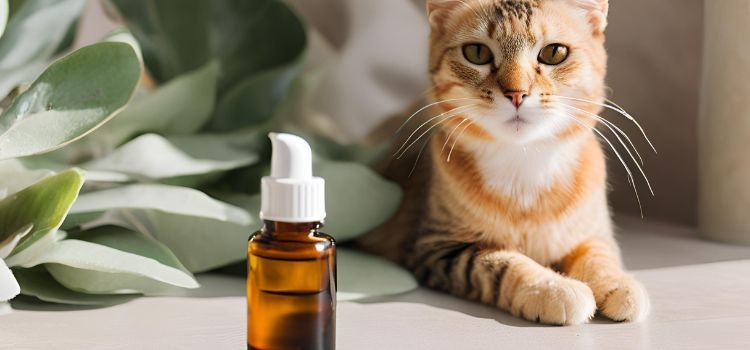
Preventive Measures
Jojoba oil has many benefits for humans, but is it safe for cats? To ensure the safety of your feline friend, understanding preventive measures is key. These measures will help you avoid any potential harm and keep your cat healthy and happy.
Storage And Accessibility
Proper storage and accessibility of jojoba oil can prevent accidental ingestion by your cat. Keeping the oil in a secure place is essential. Here are some tips to ensure safe storage:
- Store in a high cabinet: Cats are curious and can climb. Place the oil in a high, closed cabinet that your cat cannot access.
- Use child-proof containers: Containers with tight, child-proof lids can prevent your cat from opening them.
- Avoid leaving it out: Never leave jojoba oil unattended on countertops or tables. Cats can easily knock things over.
Avoid storing the oil in areas where your cat frequently roams. The kitchen, bathroom, or bedroom should be off-limits for storing such products. You can use the following table to determine safe and unsafe storage areas:
| Safe Storage Areas | Unsafe Storage Areas |
|---|---|
| High Cabinets | Countertops |
| Locked Drawers | Bathroom Shelves |
| Closets with Doors | Bedroom Tables |
By following these tips, you can minimize the risk of your cat accessing jojoba oil and ensure their safety at home.
Monitoring For Symptoms
Even with preventive measures, accidents can happen. Monitoring your cat for symptoms of jojoba oil ingestion is crucial. Some common symptoms include:
- Vomiting: Your cat may vomit after ingesting jojoba oil. Keep an eye out for frequent vomiting.
- Diarrhea: Diarrhea is another sign that your cat might have ingested the oil.
- Lethargy: If your cat appears unusually tired or sluggish, it could be a symptom.
- Loss of appetite: A sudden lack of interest in food can indicate an issue.
If you notice any of these symptoms, contact your veterinarian immediately. Early detection and treatment can prevent serious health issues. You can use the following table to log any symptoms you observe:
| Symptom | Date Observed | Notes |
|---|---|---|
| Vomiting | ||
| Diarrhea | ||
| Lethargy | ||
| Loss of appetite |
Keeping a symptom log can help your vet make an accurate diagnosis. Act quickly and monitor your cat closely for any signs of distress.
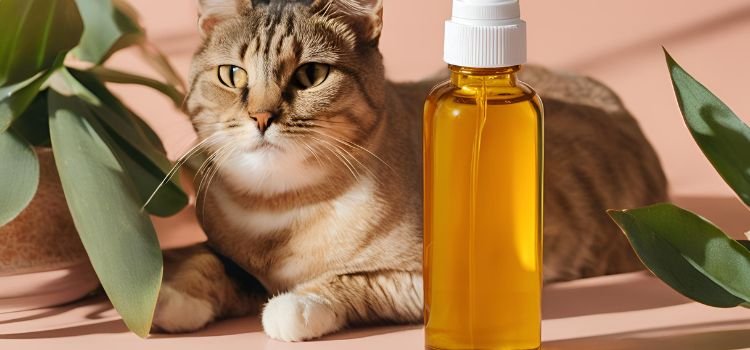
Conclusion
Jojoba oil can be safe for cats when used properly. Always consult your vet before introducing new products. Monitor your cat for any adverse reactions. With proper use, jojoba oil can benefit your cat’s skin and coat. Stay informed and prioritize your pet’s health and well-being.
Frequently Asked Questions
Olive oil and fish oil are safe for cats in moderation. Always consult your vet before adding oils to your cat’s diet.
Yes, some oils are safe for cats. Lavender, chamomile, and cedarwood are generally safe. Use them in moderation. Always consult a vet first.
Jojoba oil is generally safe for dogs to lick in small amounts. Always consult your vet for personalized advice.
Yes, you can put oil on your cat’s fur, but use it sparingly. Coconut oil is a good option. Avoid using essential oils, as they can be toxic to cats. Always consult your vet before applying any oil.
Jojoba oil is generally safe for cats when used sparingly. Always consult your vet before application.
Amazon and the Amazon logo are trademarks of Amazon.com, Inc, or its affiliates.

